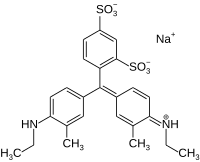Xylene cyanol
Xylene cyanol can be used as an electrophoretic color marker, or tracking dye, to monitor the process of agarose gel electrophoresis and polyacrylamide gel electrophoresis. Bromophenol blue and orange G can also be used for this purpose.
 | |
| Names | |
|---|---|
| Other names
Acid Blue 147 xylene cyanole xylene cyanol FF xylene cyanole FF C.I. 42135 | |
| Identifiers | |
3D model (JSmol) |
|
| ChemSpider | |
| ECHA InfoCard | 100.018.334 |
CompTox Dashboard (EPA) |
|
| |
| |
| Properties | |
| C25H27N2NaO6S2 | |
| Molar mass | 538.61 g·mol−1 |
Except where otherwise noted, data are given for materials in their standard state (at 25 °C [77 °F], 100 kPa). | |
| Infobox references | |
Once mixed with the sample, the concentration of xylene cyanol is typically about 0.005% to 0.03%.
Migration speed
In 1% agarose gels, xylene cyanol migrates at about the same rate as a 4 to 5 kilobase pair DNA fragment,[1] although this depends on the buffer used. Xylene cyanol on a 6% polyacrylamide gel migrates at the speed of a 140 base pair DNA fragment. On 20% denaturating (7 M urea) polyacrylamide gel electrophoresis (PAGE), xylene cyanol migrates at about the rate of 25 bases oligonucleotide.
gollark: How did you not think of that? It was incredibly obvious.
gollark: Yes, it worked.
gollark: I think you can do overhand or underhand throws backwards.
gollark: This is weird. Someone has apparently both found a.osmarks.net and found their name on it anomalously, and has asked me to remove it.
gollark: You should at least reveal the salted hashes of the queue's contents, for purposes.
References
- Lela Buckingham and Maribeth L. Flaws (2007). Molecular Diagnostics: Fundamentals, Methods, & Clinical Applications. F.A. Davis Company. p. 91.
External links
This article is issued from Wikipedia. The text is licensed under Creative Commons - Attribution - Sharealike. Additional terms may apply for the media files.